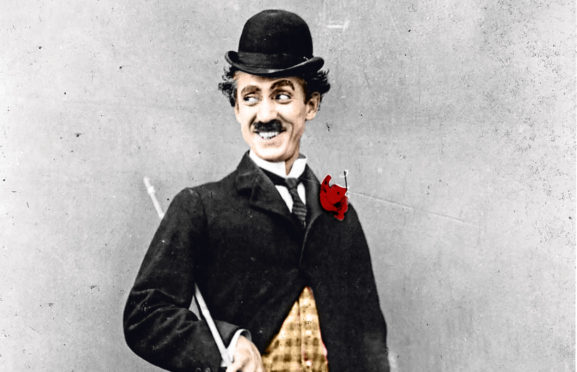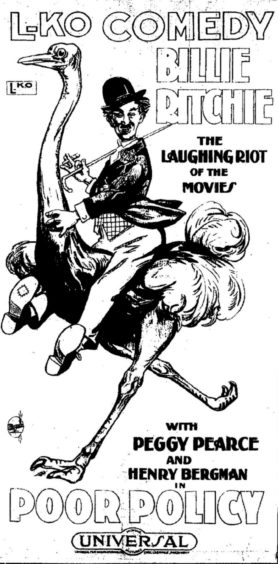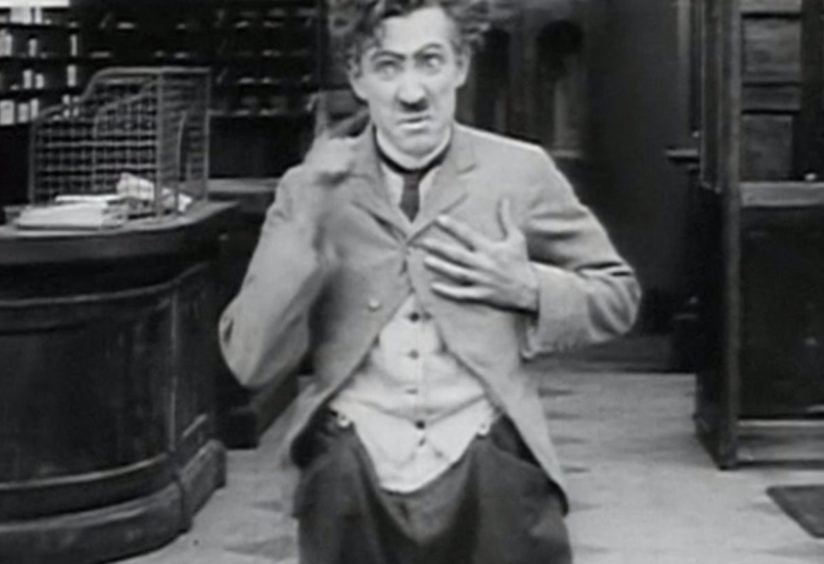
With his clipped moustache and bowler hat, deadpan demeanour and on-screen disasters, Billie Ritchie was a ringer for another icon of the silent screen.
But while Charlie Chaplin’s fame has endured through generations, Ritchie’s star flared brightly but briefly.
Today, as his career is about to recognised in a talk, fans are calling for the forgotten comic to be honoured with a blue plaque.
The Scot was one of Hollywood’s earliest A-listers with his photo gracing the side of Universal Studios’ office building on Broadway, his cardboard cut-outs stolen from cinemas by overzealous fans, and his portrait on the cover of Variety magazine.
In one publicity coup, a deaf and mute soldier traumatised by war laughed so hard at one of Billie’s films that he began to hear and talk again.
But for all the fame and adulation, by the time of his death in 1921, Ritchie was already largely forgotten, despite being one of the most bankable actors in the world just a few years before.
His career will be remembered in a talk at this year’s Hippfest, the silent movie festival in Bo’ness.
Trevor Griffiths, a lecturer in economic and social history at Edinburgh University, has researched the early years of Hollywood and believes the time is right to remember and reappraise the career of one of Scotland’s biggest stars. “In 1915, one trade paper said there were just a few names who could sell films and add box-office appeal, and those were the original Vitagraph Girl Florence Turner, America’s sweetheart Mary Pickford, Charlie Chaplin, Max Linder, who was known as the French Chaplin, and Billie Ritchie,” he said.
“I suspect that at the time of his death, popular culture wasn’t valued as much in Scotland or Britain as it later was, when Glasgow wanted to be remembered as Cinema City.
“But it is a shame there is not a memorial to him, such as a blue plaque.”
Ritchie made more than 70 films, often portraying a drunk, and he claimed to have played the role 5,000 times across stage and screen. But his likeness to Charlie Chaplin meant he was often dismissed after his death as an impersonator. According to Ritchie, though, it was Chaplin who copied him.
“They followed similar paths – going to work for London music hall impresario Fred Karno, travelling to the States on tour, and then moving into film,” explained Trevor. “Billie went to America five years before Chaplin, but Chaplin made the transition to film slightly earlier.
“If you look at Ritchie’s films, he plays a character close to Chaplin’s early guise of a tramp, but that was fairly common.
“Although there’s some resemblance in costume, they had different walks and very different characters. There are others who were much closer impersonators of Chaplin than Ritchie.”
Billie was born in Glasgow in the 1870s as William Hill. His mother, who ran a concert party in the city and was known as the Glasgow Soprano, remarried when Billie’s dad died and his name was changed to William Munro. He followed his mum on to the stage.
By the turn of the century, he was married and living in the south of England, where his daughter, Wyn, was born in 1900. He toured Britain, Europe and then, in 1905, America where he decided to stay and build his name on stage, appearing on the cover of Variety the following year.
Billie signed with film director Henry Lehrman, whose company L-KO made comedies for Universal. Lehrman’s disregard for his actors’ safety was notorious and it led to an incident during the making of Poor Policy when Ritchie is said to have been attacked by ostriches. His death in 1921, six years later, was reported in some places as being as a result of those injuries.
That was an embellishment, according to Trevor, who said the cause of death was stomach cancer. One story he does believe to be true was an incident at an Aintree cinema during the First World War.
“Corporal Beck was a motorcycle dispatch rider who was rendered deaf and mute after a German shell went off near him. He was convalescing at a military hospital near Liverpool when one day the men were allowed to go to a picture house to see a Billie Ritchie film,” explained Trevor.
“He began to laugh so hard that something in his ears popped and he realised he could not only hear again but speak. The film was marketed as the movie that restored speech and hearing to Cpl Beck – something Chaplin couldn’t claim.
“By the time of Billie’s death, he was already a bit of a distant memory. He faded away after making so many movies in 1915 and 1916. Maybe it was ill health or he began making fewer films but everything tailed off.
“After his death, he was described in the British press as being English and a Chaplin impersonator, and that stuck. There were very short notices in the Dundee press that mentioned he was Scottish, but Universal didn’t think to say he was from here. They simply dubbed him ‘the ’ero of the ’alls’ in reference to the music halls.”
Wyn, his daughter, lived until 2003, when she was 102, and was married to Ray Evans, who wrote songs like Que Sera, Sera, so she remained in Hollywood circles.
Like his daughter’s, Billie’s grave is in California, but Trevor believes there should be some sort of memorial to him in the country of his birth, where he still has relatives today.
Hippfest: Hippodrome Silent Film Festival, online from Wednesday. hippodromecinema.co.uk

Enjoy the convenience of having The Sunday Post delivered as a digital ePaper straight to your smartphone, tablet or computer.
Subscribe for only £5.49 a month and enjoy all the benefits of the printed paper as a digital replica.
Subscribe
 © The Blackhawk Collection
© The Blackhawk Collection